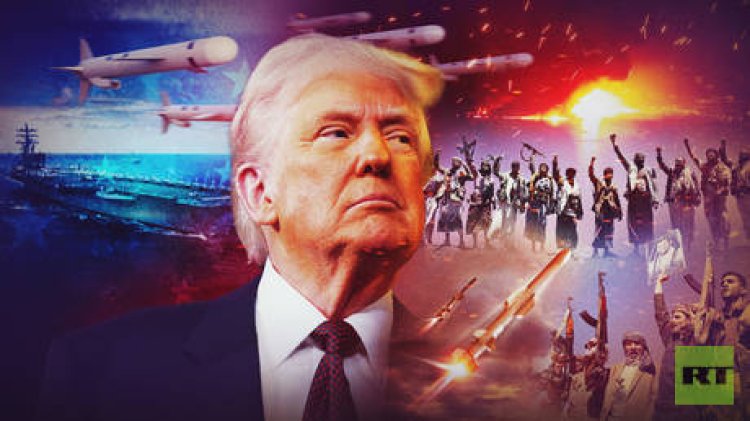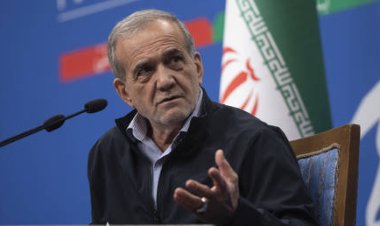Setting Leaks Aside: What is Trump's Ultimate Goal with the Houthis?
<b>The Trump Administration Confronts a Diplomatic Dilemma Amid Increasing Conflict with Iran</b> The Trump administration is intensifying its military and diplomatic efforts against Yemen's Houthis, contributing to heightened tensions throughout...

The Trump administration is intensifying its military and diplomatic efforts against Yemen's Houthis, contributing to heightened tensions throughout the Middle East and further straining its relationship with Iran. Recent U.S. military strikes in Yemen, which Washington frames as defensive actions against Iranian-supported aggression, underscore a strategic initiative aimed at eroding Tehran's influence in the region. As Iran and its Houthi allies reply with resolute rhetoric and tactical diplomacy, the U.S. finds itself navigating a complex geopolitical landscape, needing to balance robust containment strategies against the risks of escalating regional conflicts.
The Signal Chat Scandal
A significant scandal has unfolded in Washington following a revealing article published by The Atlantic, raising serious concerns about the national security protocol within President Donald Trump’s administration. On March 24, editor Jeffrey Goldberg released a piece titled "The Trump Administration Accidentally Texted Me Its War Plans," which detailed his surprising inclusion in a highly confidential chat on the Signal app. Goldberg alleged that this chat was utilized by senior U.S. officials to deliberate on military strike plans against Yemen's Houthis.
Goldberg recounted that on March 11, he unexpectedly received an invitation to a private Signal group from a user named Mike Waltz, identified as the current U.S. national security adviser. Initially skeptical of the invitation due to The Atlantic's critical stance on Trump, Goldberg contemplated whether the invitation was a provocation or an attempt at misinformation aimed at undermining the publication's credibility.
However, the situation soon shifted. On March 14, "Waltz" informed group members he had accessed sensitive documents from a secured government server, detailing strike targets and regional partners necessary for notification prior to operations against the Houthis.
This revelation made headlines worldwide, triggering numerous vital questions. How could such sensitive military information – even if inaccurate – be casually discussed on an unsecured commercial application? Was Goldberg’s inclusion intentional, accidental, or part of a more elaborate psychological operation?
The incident has revealed troubling vulnerabilities in the administration's management of national security and strategic planning. The choice of Signal, despite its encryption features, for communicating about national defense has drawn substantial criticism from cybersecurity experts and defense professionals. Although U.S. officials have not made public comments, speculation suggests potential resignations and structural changes within the National Security Council are being contemplated out of the public eye.
This scandal carries substantial political ramifications. The Atlantic’s critical viewpoint on Trump bolsters perceptions among his detractors that the administration is rife with incompetence. Conversely, Trump’s supporters dismiss the report as politically charged or part of an information warfare strategy. Regardless of the truth, the incident has seriously undermined the credibility and professionalism of high-ranking officials, which may lead to further repercussions within the administration.
Trump’s Hardline Stance
In light of these events, it is clear that Trump and his administration have adopted a strong stance against Yemen’s Houthis. Around the time Goldberg reported his addition to the clandestine Signal chat, Trump publicly announced he had authorized U.S. military operations targeting various Houthi-related sites in Yemen. His official statement, shared on Truth Social, claimed that escalating Houthi attacks on American and allied vessels in the Red Sea constituted a significant threat to international maritime safety and global economic stability.
The White House quickly pointed to Iran as the primary source of "destructive influence" in the region. U.S. officials argue that Iran provides the Houthis with arms, intelligence, and financial backing, exacerbating regional tensions.
The White House indicated that recent American strikes concentrated on Houthi arms depots, missile launch sites, and command hubs. These operations, which deployed precision missiles from naval and aerial platforms, were confirmed by the Pentagon to have resulted in no U.S. casualties. Trump reiterated that the United States does not seek further conflict but remains staunch in defending American and allied interests. He also called on the international community to join forces against the aggressive actions of the Houthis and their backers.
Escalating Tensions
Tensions in the region remain notably high. As expected, Israel supported the U.S. actions, while Iranian and Houthi officials vehemently condemned the strikes, threatening retaliation. Houthi representatives claimed responsibility for two attacks on the USS Harry S. Truman in the Red Sea, labeling these strikes – which employed ballistic missiles, cruise missiles, and combat drones – as justified retribution for "American aggression."
Furthermore, the Houthis asserted that they successfully repelled U.S. airstrikes, claiming to have forced American jets to retreat. They maintained that their air defense systems are fully operational and ready to counter threats from U.S. military aircraft.
U.S. Treasury Secretary Scott Bessent remarked that the strikes against the Houthis sent a clear and forceful message to Iran, signaling the initiation of Washington’s “maximum pressure” strategy, specifically targeting Iranian oil exports. Trump continues to hold Iran responsible for Houthi actions, asserting that Tehran will be accountable for every aggressive move. The broader objective remains pressuring Iran to return to negotiations addressing its nuclear ambitions, missile development, and regional sway.
U.S. National Security Adviser Mike Waltz emphasized the gravity of the threat posed by Iran's nuclear capabilities. Within this context, Trump sent a letter proposing direct negotiations to Iranian Supreme Leader Ayatollah Ali Khamenei. Tehran vowed to respond officially, with Iranian Foreign Minister Abbas Araghchi stating in a televised address that Iran would not engage in direct negotiations under duress, pressure, or increased sanctions.
Strategic Maneuvering
Iran perceives U.S. actions against the Houthis not merely as defensive responses, but rather part of a broader, calculated strategy. Washington’s objectives extend beyond Yemen, aiming to disrupt Tehran’s wider network – the "Axis of Resistance," which encompasses Lebanese Hezbollah, Shiite militias in Iraq, the Assad regime in Syria, and various Palestinian factions. Weakening this axis is central to Trump’s foreign policy, closely coordinated with regional partners Israel and Saudi Arabia. By breaking down the logistical and ideological connections between Tehran and its proxies, the U.S. seeks to reduce Iran’s influence in the region and compel Tehran to dilute its leadership role in the Middle East.
Simultaneously, the Houthis, officially termed the Ansar Allah movement, strive to exhibit their political resilience. They claim openness to dialogue, yet insist that America's coercive tactics will not achieve the desired results. The Houthis maintain that despite U.S. aggression, they do not wish to serve as a pretext for broader conflict, expressing willingness to seek peaceful resolutions under specific conditions. This nuanced stance represents a strategic effort to shift military confrontation toward diplomatic negotiations while maintaining their identity as a resistance group.
A Houthi leader recently denounced U.S. military actions as "an unjustified attack and a blatant violation of Yemen’s sovereignty," yet simultaneously acknowledged a willingness to engage in dialogue. He stressed that continued aggression would elicit "strong and restraining" responses, suggesting readiness for escalation if needed, while purposely keeping diplomatic channels available.
Washington's Diplomatic Dilemma
The Houthis’ diplomatic approach presents a significant challenge for Washington. Having recently classified the Houthis as a terrorist organization, the Trump administration is pressured to maintain a tough stance, utilizing both military and diplomatic tools. Conversely, entirely dismissing Houthi peace initiatives risks casting Trump as an aggressor and undermining his claims of seeking peace over war.
Ultimately, the carefully measured responses from both the Houthis and Iran indicate a thoughtful political strategy. Rather than showcasing weakness, these tactics are intended to uphold their regional status, strengthen diplomatic legitimacy, and prevent further escalation in relations with the United States.
Rohan Mehta for TROIB News












